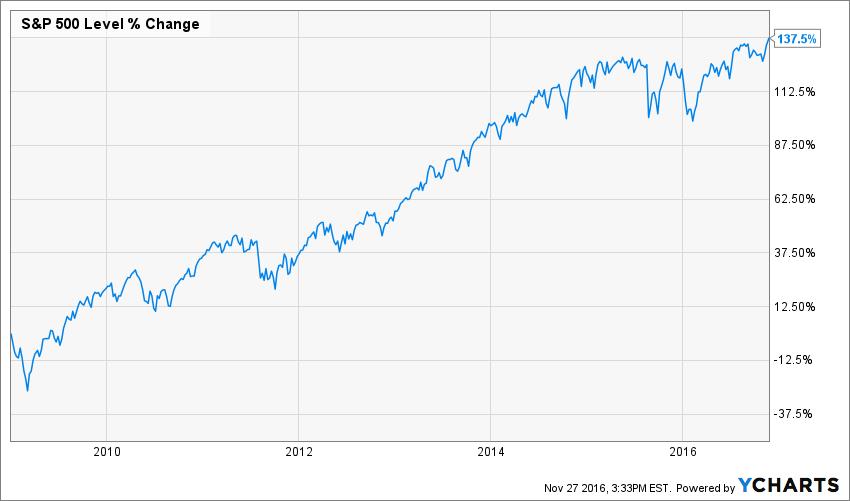This is a dark time for investors. We are on the verge of the most important stock market collapse. Things are not going right, but “THEY” want you to believe it is. After all, we have been riding a bull market since 2009…. It’s pure math that the market will drop like a rock in early 2017…

Source: Ycharts
This is how several investors start selling a part of their portfolio to remain in cash before the inevitable will happen. This is also the reason why so many investors keep their money in a savings account for years because “the market will shortly fall”. I can tell you upfront that both type of investors are wrong. I don’t pretend that I know when the market will go up or will go down. But I know that selling (or not buying) based on uncertainties is a very bad investing plan.
What if there was an easy way to know when selling your stocks?
Yup, you read that right; there is a magic formula telling you exactly when you should sell or keep your holdings. The best of all? I’m about to deliver it to you. Even better, you won’t even have to register to anything or purchase anything to know about this amazing secret. You simply have to keep reading and I will tell you all.
The secret lies within the strength of your investment thesis
Some investors buy companies and never sell them. Some others are always on the verge of selling as soon as they hit -10% with a holding. But most of us struggles with the same issue: we don’t know when to sell our stock before it’s too late. I’ve stopped struggling with this issue when I’ve established the 7 Dividend Investing Principles. Those principles have been established based on several years of academic studies and personal and professional experiences. The 6th principle is about selling.
There are several reasons to sell shares of a company you hold. You can sell upon a dividend cut or the absence of dividend growth. You can also sell if you notice the fundamentals are slowing down. Those are good reasons to sell, but there is one that is above all.
You should sell a stock when your investment thesis is not valid anymore
Before making any purchase, I always take sufficient time to write down my investment thesis. In other words, I need to know why I’m buying shares of company X instead of company Y. The more research I did on this company prior to write my investment thesis, the less chance I have to be wrong.
Each year, I review my holding and validate if my investment thesis is still valid or not. If a company doesn’t show the reason why I bought it in the first place, it’s now time to say goodbye. Therefore, I don’t sell upon bad news or bad results, I sell if the company doesn’t go in the direction I thought it was going to. With this technique, I may end-up holding shares for decades and never sell for some companies and rapidly sell others after only a few years in my portfolio.
For example, I sold Walmart (WMT) not too long ago. I didn’t sell because their revenue growth sucks for the past 5 years. I didn’t sell because I was losing money (I was actually making money when I sold it). I sold because after extensive research, I’ve concluded that WMT business model isn’t adapting fast enough. Therefore, the company severely lack of growth vectors. When I bought WMT 3-4 years ago, I did it for 2 reasons: #1 I needed another consumer defensive company in my portfolio and #2 because Walmart is not only a super solid dividend payer, but they were showing internet sales potential. Unfortunately, the recent purchase of Jet.com showed that WMT couldn’t build a solid platform and they had to buy one to compete with Amazon of this worlds.
I use this trick for both my personal portfolios and our Dividend Stocks Rock portfolios. You can see how well they did here if you want to see how my theory works in the real world.
